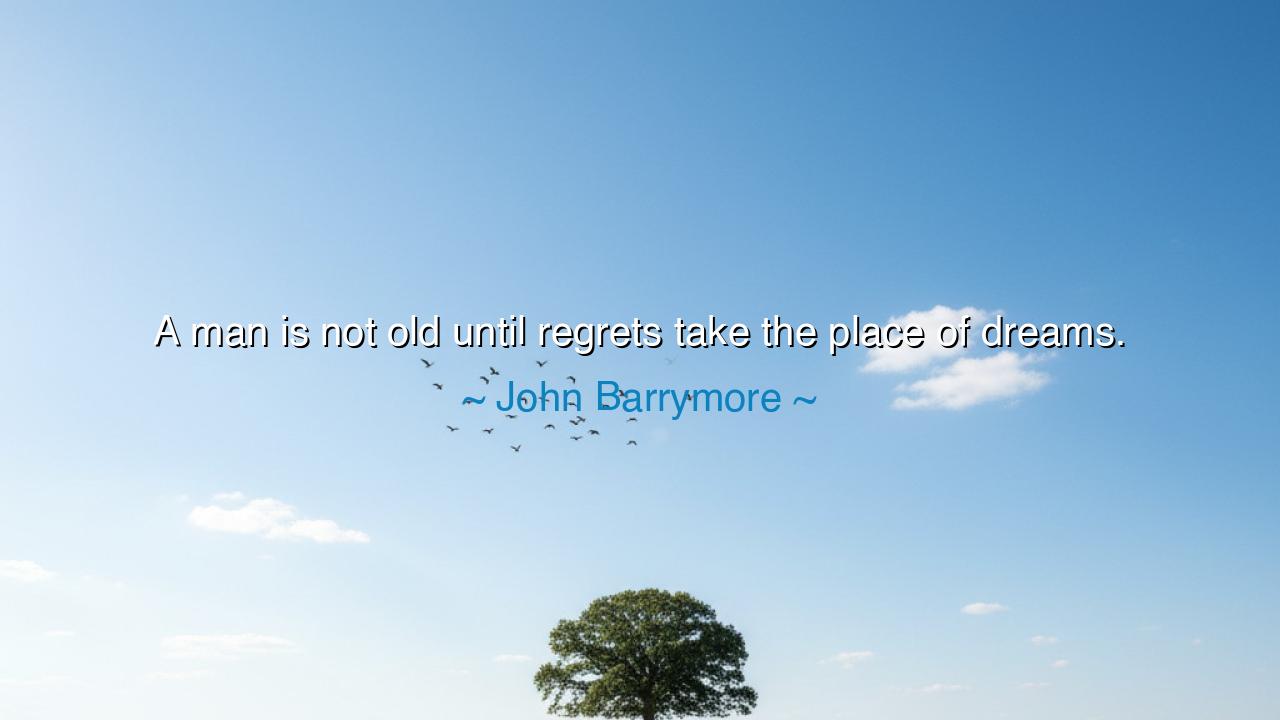
A man is not old until regrets take the place of dreams.






“A man is not old until regrets take the place of dreams.” Thus spoke John Barrymore, the great actor of the early twentieth century, whose life danced between brilliance and ruin, laughter and sorrow. His words, though born in an age of theatre, carry the eternal pulse of human truth. For age, he reminds us, is not counted by the years etched upon one’s flesh, but by the fire that still burns—or no longer burns—within the heart. When a man’s dreams fade and he begins to dwell upon regret, his youth, no matter his body, is gone.
This saying reaches deep into the ancient understanding of life’s rhythm. The body may wither, the hair may whiten, the steps may slow, yet a soul that still dreams walks always in springtime. But when the spirit turns backward—when it feeds upon “what could have been” instead of “what might yet be”—then the true winter sets in. Regret is the frost that kills the garden of the soul; dream is the sun that revives it. Barrymore, who knew both glory and despair, understood this better than most. He had seen how easily passion could decay into self-pity, how swiftly youth’s daring could turn to the bitterness of memory.
The ancients often spoke of the “ever-young” — those whose hearts stayed restless in pursuit of meaning. Consider Leonardo da Vinci, who in his final days, old and frail, still filled his pages with sketches of inventions yet unmade, faces yet unseen, wonders yet to be discovered. Though his hands trembled, his dreams did not. He died dreaming of the flight of man. Such a life is never old, for its gaze remains upon the horizon. In contrast, how many die long before their final breath—buried not in earth, but beneath the weight of their own regrets.
Barrymore himself was a man of vast talent and tempestuous life. He knew fame, wealth, and admiration, yet also the abyss of addiction and decline. This quote was not the boasting of a triumphant man, but the reflection of one who had looked upon his own failures and learned to wrest from them a final wisdom. He understood that the true tragedy of aging is not the loss of strength, but the loss of purpose. To live without vision is to wander the corridors of time like a ghost, haunted by unfulfilled possibility.
The lesson is plain, yet profound: as long as you dream, you are alive. The moment you trade your hopes for your memories, you have surrendered to decay. Let your heart remain young by daring still—daring to love, to learn, to create, to begin again. The soul that continues to imagine has cheated age, no matter the lines upon its face. For what is time but the measure of our desire? When desire is gone, even the dawn feels old.
Yet to live without regret does not mean to forget the past. The wise do not erase their mistakes—they transform them into wisdom. Every regret can be reshaped into resolve, every failure into fuel for a new dream. The past cannot be changed, but it can be redeemed by what we build upon it. Like an artist who turns a broken sculpture into something new, so too can the heart make beauty from its losses. The power to begin again is the secret of immortality.
So, my child of the fleeting days, remember this: guard your dreams as sacred fires. Let not the chill of disappointment smother them. When the world tells you to stop dreaming, dream louder. When you look upon your past and see mistakes, let them remind you not of what has ended, but of what is still possible. Do not grow old by counting the years—grow young by counting the visions still alive within you.
For the man who dreams walks with eternity; the man who regrets walks with shadows. Let your life be a torch that burns until its final breath—not dimmed by remorse, but brightened by wonder. Thus you shall never truly age, for in every dream renewed, you shall be born again.






AAdministratorAdministrator
Welcome, honored guests. Please leave a comment, we will respond soon